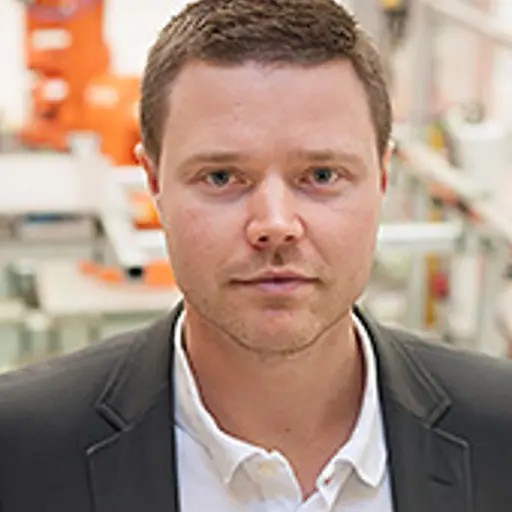Course syllabus adopted 2021-02-26 by Head of Programme (or corresponding).
Overview
- Swedish nameProjektkurs i mekatronik
- CodeIMS060
- Credits7.5 Credits
- OwnerTIMEL
- Education cycleFirst-cycle
- Main field of studyAutomation and Mechatronics Engineering
- ThemeEnvironment 1 c
- DepartmentINDUSTRIAL AND MATERIALS SCIENCE
- GradingTH - Pass with distinction (5), Pass with credit (4), Pass (3), Fail
Course round 1
- Teaching language Swedish
- Application code 67113
- Maximum participants60
- Open for exchange studentsNo
- Only students with the course round in the programme overview.
Credit distribution
Module | Sp1 | Sp2 | Sp3 | Sp4 | Summer | Not Sp | Examination dates |
|---|---|---|---|---|---|---|---|
| 0120 Project 7.5 c Grading: TH | 7.5 c |
In programmes
Examiner
 Anders Skoogh
Anders Skoogh- Full Professor, Production Systems, Industrial and Materials Science
Eligibility
General entry requirements for bachelor's level (first cycle)Applicants enrolled in a programme at Chalmers where the course is included in the study programme are exempted from fulfilling the requirements above.
Specific entry requirements
The same as for the programme that owns the course.Applicants enrolled in a programme at Chalmers where the course is included in the study programme are exempted from fulfilling the requirements above.
Course specific prerequisites
-Aim
The purpose is to enable effective development and application of mechatronic products by means of structured project work. The aim of the course is to provide the students with knowledge and abilities in structured project methodology, including for example planning, specification, selection methods, verification, and project management.Learning outcomes (after completion of the course the student should be able to)
- Formulate a clear problem and create a project plan
- Specify the requirements of a technical system including mechatronic components
- Select and apply engineering methods and tools to solve a given problem
- Compare possible solutions from a sustainability perspective
- Produce project results following an established project methodology
- Work in a project team and analyze the work in terms of group dynamics
- Write a technical report following an established structure, including referencing, tables and figures according to praxis.
- Present project results and own reflections to fellow students
- Give constructive feedback to the work of other project groups
- Develop and analyze a project in terms of entrepreneurial thinking
Content
- Project work in specification, development, and application of mechatronic products
- Project management and planning
- Team work: theory and practice
- Entrepreneurial thinking
- Presentation of project results: orally using an A2 poster and in a written technical report
- Opposition
Organisation
The course is based on a practical project work on development and application of mechatronic products. Students are divided in different projects groups and assigned a project task. Each project group gets a supervisor to support the students in achieving the project and course goals. The supervision can include support in selecting engineering methods, finding solutions to unexpected problems, technical support with software and products, and advice in technical reporting. In addition, the course contains lectures and seminars providing knowledge in project management, project planning, requirement specification, evaluation methods, group dynamics, and entrepreneurial thinking. Each project group gets a virtual project room for continuous and transparent communication and documentation.Literature
- Project methodology
- Scientific papers
- Lecture materials
Examination including compulsory elements
Grading is based on several aspects of the project work and results. This includes: technical report, A2 poster presentations, mandatory knowledge test, evaluation of project colleagues, opposition, and reflection on group dynamics. Grades are individual and the scale is 5, 4, 3, Fail.The course examiner may assess individual students in other ways than what is stated above if there are special reasons for doing so, for example if a student has a decision from Chalmers about disability study support.